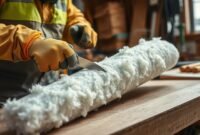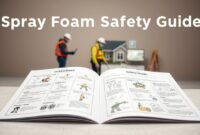Do you have a drafty garage that’s wasting your energy and money? Many people deal with high bills and temperature swings because of bad insulation. This heat loss can really increase your energy costs, leaving you feeling cold and unhappy.
I’ve found affordable ways to make your garage more energy-efficient. Insulating your garage ceiling doesn’t have to cost a lot. By learning the right steps, you can make your garage cozy and save money at the same time.
In this guide, I’ll share simple, budget-friendly tips to help you fix your garage insulation problems.

Understanding the Importance of Garage Ceiling Insulation
Garage ceiling insulation is a big deal for home energy efficiency. As a homeowner, I’ve seen how it makes your living area more comfortable and saves energy.
Insulating your garage ceiling does more than just control temperature. It’s a smart move that brings many benefits. Here’s why it’s so important:
Impact on Energy Efficiency
Insulating your garage ceiling can save a lot on energy costs. It acts as a thermal barrier, stopping heat from moving between your garage and home. This makes your heating and cooling systems work less, cutting your energy bills by up to 20%.
- Reduces overall energy consumption
- Minimizes heat loss during winter
- Prevents heat gain during summer
Temperature Regulation Benefits
Insulating your garage ceiling is great for keeping temperatures steady. It helps keep your garage and living areas at a consistent temperature, no matter the weather.
Read also: How to Insulate a Garage Ceiling Like a Pro
Protection for Stored Items
Garage ceiling insulation also protects your stuff. It keeps a stable environment, preventing damage to tools, sports gear, and seasonal items from extreme temperatures.
- Prevents moisture buildup
- Reduces risk of mold and mildew
- Protects sensitive equipment
Cost Analysis of Different Insulation Materials
Looking for the cheapest way to insulate your garage ceiling? It’s important to know the cost of different materials. Insulating a two-car garage can cost between $1,500 and $6,700. This depends on several key factors.
I’ll show you the most affordable options for insulating your garage ceiling. This will help you find a cost-effective solution without sacrificing quality.
| Insulation Type | Cost per Square Foot | Estimated Garage Coverage | Energy Efficiency Rating |
|---|---|---|---|
| Fiberglass Batts | $0.30 – $0.50 | 200-300 sq ft | Moderate |
| Blown-in Cellulose | $0.50 – $1.10 | 250-350 sq ft | High |
| Spray Foam | $1.50 – $3.00 | 150-250 sq ft | Very High |
When looking for the cheapest insulation for your garage roof, consider these factors:
- Initial material costs
- Long-term energy savings
- Installation complexity
- Durability of the insulation
Fiberglass batts are the most affordable option for insulating your garage ceiling. They offer a good balance between cost and performance. Remember, the cheapest upfront cost doesn’t always mean the best long-term value.
Your garage size, local climate, and intended use will help choose the right insulation. Take your time to evaluate each option carefully. This will help you make the best decision for your budget and needs.
Essential Tools and Materials for DIY Installation
Starting a DIY garage ceiling insulation project needs the right tools and materials. I’ll guide you through what you need for a budget-friendly home improvement.
Basic Equipment Checklist
Having the right tools is key when insulating a garage on a budget. Here’s what you’ll need:
- Utility knife with extra blades
- Sturdy ladder
- Measuring tape
- Staple gun
- Protective plastic sheeting
- Caulk gun
Safety Gear Requirements
Even when saving money, safety should never be ignored. Here’s the safety gear I recommend:
- Respirator mask
- Safety glasses
- Work gloves
- Long-sleeve shirt
- Protective coveralls
Additional Helpful Supplies
For a more efficient insulation project, consider these extra supplies:
- Vapor barrier
- Insulation support wires
- Foam sealant
- Work light
- Dust pan and brush
Investing in these tools and safety gear will prepare you for a safe and affordable garage ceiling insulation project. Remember, proper preparation is essential for a successful DIY project.
Preparing Your Garage Ceiling for Insulation
Preparing your garage ceiling for insulation is a big step. It starts with solid groundwork. I’ll guide you through the key steps for a successful project. This will help you save energy and avoid problems.

First, do a full check of your garage ceiling. Here are the main steps to prepare:
- Clear out all items from the garage ceiling area
- Inspect for existing moisture or water damage
- Check for any structural issues
- Measure the ceiling space accurately
- Identify and seal any air leaks or gaps
Figuring out how much insulation you need depends on several factors. Make a detailed checklist to help you prepare.
| Preparation Step | Key Considerations | Estimated Time |
|---|---|---|
| Moisture Check | Inspect for leaks, water stains | 1-2 hours |
| Electrical Safety | Turn off power, check wiring | 30-45 minutes |
| Surface Preparation | Clean, remove old insulation | 2-3 hours |
| Gap Sealing | Caulk and seal all openings | 1 hour |
Proper preparation is key for insulating your garage ceiling right. By carefully assessing and preparing your space, you’ll set up your garage for effective insulation. This will save energy and keep your garage safe.
Cheapest Way to Insulate Garage Ceiling
Finding the cheapest way to insulate your garage ceiling is easy and affordable. Fiberglass batt insulation is the top choice for DIY fans. It’s a cost-effective way to make your garage more energy-efficient.
Fiberglass Batt Installation Method
I suggest starting with fiberglass batts for insulation. These pre-cut panels fit well between ceiling joists, making installation easy. Here’s how to do it:
- Measure the spacing between your ceiling joists accurately
- Purchase fiberglass batts that match the joist width
- Wear protective gear like gloves and a dust mask
- Cut batts to fit snugly between joists
- Ensure complete coverage without compression
Cost-Saving Tips and Tricks
To save money, look for sales at home improvement stores. Buy in bulk and check for rebates. Compare prices online and in-store to find the best deals.
Time-Efficient Approaches
Prepare all materials before starting. Work in small sections to ensure each area is well-insulated. Using a sharp utility knife and having a helper can make the job faster. This way, insulating your garage ceiling is both cheap and efficient.
Alternative Budget-Friendly Insulation Options
Looking for a cheap way to insulate your garage ceiling? You have several options beyond traditional fiberglass batts. Each choice has its own benefits for those on a budget.
Blown-in cellulose insulation is a top pick for saving money. It’s made from recycled materials and fits well in odd-shaped spaces. It’s also very effective at keeping your garage warm or cool, all for less than pricier options.
- Rockwool batts: Provides excellent sound dampening
- Cotton batts: Eco-friendly and non-irritating
- Loose-fill fiberglass: Great for hard-to-reach areas
- Reflective barriers: Inexpensive additional insulation layer
Structural insulated panels (SIPs) are also worth considering. They might cost a bit more upfront, but they save energy in the long run. They’re perfect for garages with tricky layouts or hard-to-reach areas.
When choosing insulation, think about your local climate, how you use your garage, and your budget. Each option has its own advantages and disadvantages. Take your time to find the best fit for your needs.
Common Mistakes to Avoid During Installation
When you’re insulating your garage ceiling, even the best DIY folks can make mistakes. Knowing these common errors can save you time, money, and stress.
Insulating your garage ceiling right means paying attention to details. Avoiding common mistakes is key to a successful project.
Read also: How Much Does it Cost to Insulate a Garage
Material Selection Errors
- Choosing insulation with the wrong R-value for your area
- Choosing materials just for their price
- Not checking if the insulation can handle moisture
Installation Pitfalls
During installation, several mistakes can lower your insulation’s performance:
- Leaving gaps between insulation batts
- Compressing the insulation
- Not cutting and fitting insulation around obstacles right
Safety Oversights
| Safety Concern | Potential Risks | Prevention |
|---|---|---|
| Not wearing enough protective gear | Skin irritation, breathing problems | Wear long sleeves, gloves, and a respirator |
| Ignoring electrical dangers | Shock, fire risk | Turn off power, use tools that don’t conduct electricity |
| Not having good air flow | Chemical exposure | Work in areas with good air circulation |
Knowing these common mistakes helps make your garage ceiling insulation project a success. Take your time, do your research, and ask a pro if you’re not sure about anything.
Read also: Basement Ceiling Sound Insulation
Proper Ventilation Considerations
When insulating your garage ceiling, ventilation is key, more so if it’s connected to your living area. I’ve found that good airflow is as vital as knowing how much insulation to use. Without it, your insulation won’t work well and could even be harmful to your health.
Good ventilation in your garage does many things. It keeps the temperature right, stops moisture from building up, and gets rid of harmful fumes from cars or chemicals. It makes sure your insulation works well and keeps your living area and stored items safe.
- Install soffit and ridge vents to create natural air circulation
- Consider mechanical ventilation systems for improved airflow
- Use exhaust fans to remove potentially harmful gases
- Implement air gaps between insulation and roof decking
There are many ways to ventilate your garage, and what works best depends on your garage’s layout. It’s wise to talk to a pro to find the best solution for your space.
| Ventilation Type | Cost Range | Effectiveness |
|---|---|---|
| Passive Vents | $50-$200 | Moderate |
| Mechanical Exhaust Fans | $200-$500 | High |
| Comprehensive Ventilation System | $500-$1,500 | Very High |
Getting the right ventilation might seem like an extra cost. But it’s really important for keeping your garage insulation in top shape. It also helps keep your living space air clean and safe.
Maintenance and Long-Term Care
After you finish insulating your garage ceiling, keeping it up is key. This ensures your investment lasts and works well over time. Your garage ceiling needs regular checks to stay effective and avoid problems.
To keep your garage ceiling insulated, follow some important steps. These can help your insulation last longer and avoid expensive fixes.
Regular Inspection Guidelines
- Do visual checks every six months
- Watch for moisture or water damage signs
- Look for gaps or compression in insulation
- Check for pest problems or nests
Addressing Common Maintenance Issues
It’s smart to tackle problems with your garage ceiling insulation early. Small issues can get worse fast if not fixed.
- Seal any cracks or gaps right away
- Replace damaged insulation sections
- Make sure there’s good ventilation to avoid moisture
- Watch for mold or mildew signs
If you face big problems or damage, get help from a pro. They can give you the best advice and fix or replace your insulation.
Long-Term Care Tips
With the right care, your garage ceiling insulation can last 15-20 years. Regular upkeep keeps it working well. It also keeps your garage energy-efficient and protects your stuff from extreme temperatures.
Return on Investment and Energy Savings

Adding insulation to your garage ceiling can really boost your home’s energy use. You can cut energy costs by up to 15%. This is a big deal, mainly for garages that share a wall with your living space.
Here are the money-saving perks of insulating your garage:
- Lower energy bills right away
- Better control over the temperature
- More comfort in your living area
- Higher home value
Looking at the long-term, the benefits of insulation are clear. Your savings depend on:
- Your local weather
- How efficient your HVAC is
- The size and layout of your garage
- The quality of the insulation
| Insulation Type | Average Cost | Energy Savings | Payback Period |
|---|---|---|---|
| Fiberglass Batts | $0.50-$1.50/sq ft | 10-15% | 3-5 years |
| Spray Foam | $1.50-$3.00/sq ft | 15-20% | 2-4 years |
| Rigid Foam Boards | $1.00-$2.50/sq ft | 12-18% | 3-5 years |
I suggest seeing garage ceiling insulation as a smart investment. Choose the best insulation for your home. This way, you’ll save a lot on energy and make back the cost of installation quickly.
Conclusion
Exploring ways to insulate your garage ceiling shows that smart choices balance cost and performance. The key is to aim for an R-value of R30-R40 for the best energy efficiency.
Choosing the right insulation depends on your needs and budget. Fiberglass batts are a cost-effective option. Proper installation and preparation are key to making your insulation work well.
Investing in good installation and upkeep pays off in the long run. It makes your garage more comfortable and protects your belongings. It also helps save energy and money.
With the tips from this guide, you’re ready to insulate your garage ceiling. Plan well, pick the right materials, and pay attention to details. This way, you’ll get a good insulation job without spending too much.


